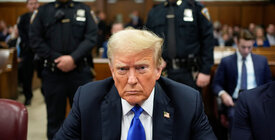This piece first appeared in Civil Discourse with Joyce Vance on Substack.
Until now, every federal judge that considered the issue — all eight of them — unanimously found that attorneys general have the constitutional authority to appoint a special counsel. But Judge Aileen Cannon disagrees. In a 93-page opinion, nicely timed for the first day of the Republican convention, she held that Jack Smith’s service as special counsel violates both the Appointments Clause and the Appropriations Clause of Article II of the Constitution. Having made that finding, she dismissed the entire indictment that charges Trump with reckless mishandling of classified documents and obstruction of justice.
Article II permits Congress to “vest the appointment” of “inferior Officers” in the head of a department, like the attorney general. The provision permits the executive branch to bypass the cumbersome process of presidential appointment and Senate confirmation in cases where Congress authorizes it.
Jack Smith, like special counsels before him, argued that Congress did that in 28 United States Code § 533(4), which authorizes the attorney general to appoint officials “to conduct such other investigations regarding official matters under the control of the Department of Justice . . . as may be directed by the Attorney General.” That’s what special counsels do; they conduct investigations in matters that would otherwise be directed by the attorney general. The law seems to fit the conditions described in Article II of the Constitution, and that’s what every judge to consider the matter before Aileen Cannon concluded.
Judge Cannon got a real boost here from Justice Clarence Thomas’ concurring opinion in the immunity decision, Trump v. United States. Thomas, who wasn’t able to get anyone else to sign on, wrote that he would have also dismissed the election interference case in the District of Columbia on the basis of the same argument Judge Cannon employed some two weeks later. It’s not clear whether Justice Thomas truly is the only vote on the Supreme Court for this argument or whether no other justice joined in because the issue wasn’t properly raised in that case. Justice Thomas took it up even though it had not been briefed. Nonetheless, Judge Cannon cited his opinion three times in her decision.
Jack Smith, like the 93 U.S. attorneys nationwide, cannot take an appeal without the permission of the solicitor general. That’s a Justice Department rule. But apparently, the solicitor general didn’t have to think very hard about this one. Late in the day, the special counsel’s spokesman announced that they had her blessing and would be appealing, stating, "The dismissal of the case deviates from the uniform conclusion of all previous courts to have considered the issue that the Attorney General is statutorily authorized to appoint a Special Counsel. The Justice Department has authorized the Special Counsel to appeal the court’s order."
That means that the question of where the other justices are on this issue is an important one because the appeal is coming. First, it will go to the Eleventh Circuit Court of Appeals in Atlanta. Once they reach their decision, the losing party will try to enlist the Supreme Court to take up the case. It’s not obligated to do that, but if it follows the pattern of other Trump-related cases, it’s likely to hear the appeal. One way or the other, the final decision about whether Judge Cannon’s dismissal order stands will be in the Court’s hands, either because it decides the issue or because it lets a lower court’s decision stand.
In December 2022, it took the Eleventh Circuit Court of Appeals just nine days and 21 pages to reject Judge Cannon’s decision to indulge Donald Trump’s unprecedented effort to prevent the Justice Department from using evidence it obtained during execution of a judicially authorized search warrant to investigate the case. The court of appeals delivered a resounding bench slap, telling the judge to stand down and that she had no jurisdiction in the matter, which was essentially an end run designed to prevent any investigation into Trump’s possession of classified documents long after he had told the Justice Department he had returned everything. The question now is, will the court do it again? Will it move quickly, and will it reject Judge Cannon’s decision that — except for the Thomas concurrence, which does not have the force of law — contradicts every other decision on this issue.
Even if the Eleventh Circuit moves quickly, there is no guarantee that the Supreme Court will. With that caveat, let’s explore some possible outcomes here:
- First off, I don’t expect that this case will be refiled in another district, and certainly not in the District of Columbia, where some people have suggested it should have and could have originally been filed. All else being equal, prosecutors would have certainly preferred to bring the case in DC, in part because of the judges’ familiarity with handling classified information. But the charge in this case is reckless mishandling — not theft of the documents — and obstruction of justice. Criminal cases must be brought in the federal district where the criminal conduct occurred, and that’s the Southern District of Florida, where Mar-a-Lago is located. If the government had proof beyond a reasonable doubt of crimes committed in the District of Columbia, they would likely have brought the case there originally. That they didn’t is telling, and ultimately wise, since the Supreme Court’s immunity decision incredibly — I still can’t quite wrap my mind around this — suggests that walking off with Top Secret materials could be official presidential conduct that Trump gets immunity for.
- There’s a footnote here, though, involving Trump’s property in Bedminster, New Jersey, where there was evidence Trump had at least one classified document that he waved around in a meeting, acknowledging he knew he wasn’t supposed to have it. We haven’t seen charges involving Bedminster yet, which suggests the special counsel either didn’t believe they could prove some elements necessary to charge a case, that it wasn’t significant enough to be a stand-alone case, or that because they learned about it so late in the game, they decided to go forward just on the basis of Mar-a-Lago. We may learn if Cannon’s dismissal of their case changes that calculus; see below. But it’s unlikely that the conduct in Florida could be recharged in New Jersey in any event.
- With the case dismissed by Judge Cannon, the U.S. attorney in Southern Florida could seek a new indictment, which would avoid the special counsel problem. But if they did, the case would almost certainly be reassigned to Judge Cannon as a “related case,” a rule meant to avoid “judge shopping,” where a lawyer, dissatisfied with the judge they’ve drawn for a case, dismisses it and refiles in hopes of getting a better one. This is a circuit that seriously frowns upon judge shopping (here’s an example of a trans rights case in Alabama where federal judges in different districts have joined forces to punish lawyers for what they believe to be judge shopping, although the lawyers have denied it). A new indictment now would almost certainly go to Judge Cannon.
- The best outcome for the government would be to get the case to the Eleventh Circuit quickly and obtain a ruling reversing Judge Cannon. The icing on the cake would be to have the circuit order that the case be reassigned on remand to a new judge. As we discussed, that’s a possibility here where a judge has been reversed repeatedly in a matter, and Judge Cannon’s behavior certainly has cast the integrity of the courts into question. Clearing the air by assigning a new judge would be the institutionally sound move here.
- But appeals involve delay. Even if the three-judge panel moves quickly like the one in the search warrant matter, Trump might still be able to use an appeal to create more delay. The first move would be to ask the full court to rehear any adverse decision en banc — with all active circuit judges participating in the case. The Eleventh Circuit didn’t do that the last time, so we’ll see if the circuit is as serious about the rule of law as it was the last time Judge Cannon tried to put her thumb on the scales of justice for Trump.
- Whichever side loses in the court of appeals will likely try to go to the Supreme Court. If Trump were to win in Atlanta, then we would have a “split in the Circuits” — a situation where different courts have adopted different rules and are looking to the Supreme Court to settle the matter. If the Eleventh Circuit sides with its sister circuit in the District of Columbia, based on decades of consistent practice on this point, there would be little reason for the Supreme Court to take the case. But, of course, we now live in a precedent-free environment when it comes to the Supreme Court. I can’t predict what they would do. But it’s clear that the matter wouldn’t be decided until after the election, barring an utterly unusual burst of speed that we didn’t see from them on the weightier presidential immunity case.
- There is another possibility, although it’s less likely. The Eleventh Circuit might affirm Judge Cannon’s decision, leaving the Justice Department to take over the case from the special counsel, reindict, and move forward with it, but also order that the case be assigned to a new judge on remand. The rationale for doing that is far weaker if it doesn’t find that she erred on this issue; perhaps it might be a way of splitting the baby. The special counsel had asked Judge Cannon, if she ruled against them, to give them permission to brief remedies other than dismissing the indictment. But she declined to do that. One possibility here is that the Eleventh Circuit could find her decision on the constitutionality of the special counsel was correct but that she should have entertained other possibilities — such as permitting a U.S. attorney to take over the case or to supervise existing personnel with the special counsel’s office — and rule that a different judge should be assigned to make that consideration given Cannon’s track record.
- If the case does end up in a posture where the only option is for a U.S attorney to obtain a new indictment from a grand jury and the case is reassigned to Judge Cannon, the special counsel will have to decide whether to seek her recusal immediately this time. They didn’t do that here, likely concerned about the delay involved. In hindsight, it would have been the better course of action. Even if unsuccessful, they would have at least known for certain what they had to contend with. Judge Cannon has been one piece of Trump’s incredible luck in the courts.
Will this decision impact the election interference case in Washington, DC? Even Judge Cannon conceded in her order that it applied only to the case in front of her. But with jurisdiction in the election interference case about to be restored to Judge Tanya Chutkan by the Supreme Court, expect Trump’s lawyers to file for an additional stay to keep that case from restarting, arguing that it has to remain inactive while the Eleventh Circuit appeal proceeds to avoid any prejudice to their client. If Chutkan refuses, they’re likely to take their request for a stay all the way to the Supreme Court.
Often, judges decide difficult issues, close issues, where the call could go either way. Even the Supreme Court frequently decides cases 5–4 or 6–3, with the justices seeing issues differently. But, and I think it’s important to reiterate this, that’s not what’s going on with Judge Cannon in this case. She looked at the law and went 180 degrees from it to rule in Trump’s favor. She assessed the issue here in a way that no other court to consider the constitutionality of appointing a special counsel has. And although she wrote that her ruling applied only in this case, that’s not how precedent works. If her decision were to stand, it would throw a monkey wrench into other cases where an outside lawyer was brought in to act as a special counsel.
This decision was a bad one, and if the higher courts permit it to stand, it will do further damage to public confidence in the courts.







